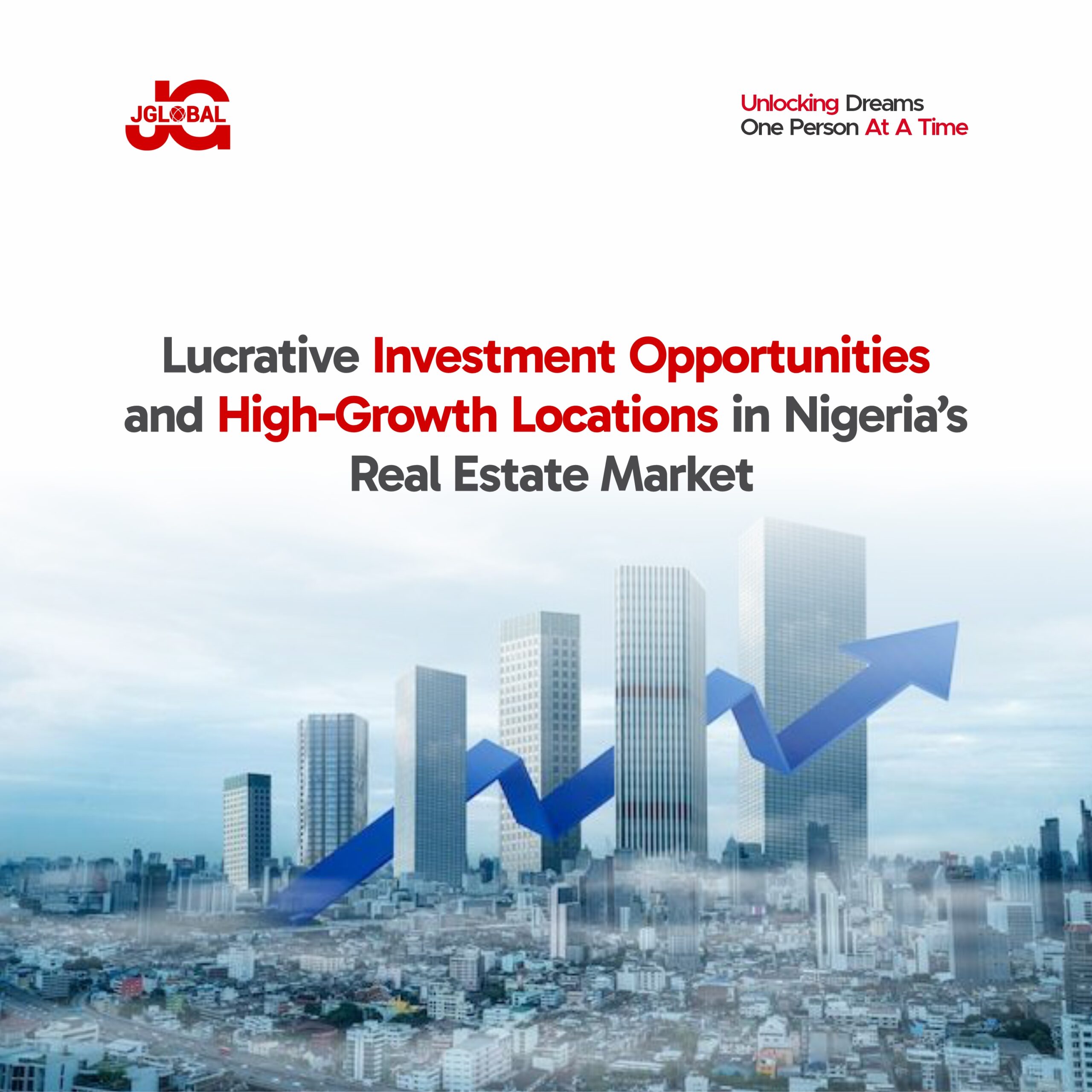Lucrative Investment Opportunities and High-Growth Locations in Nigeria’s Real Estate Market

Nigeria’s real estate investment market has become one of the most attractive investment sectors in Africa, offering numerous lucrative opportunities in high-growth areas across the country. This growth is driven by rapid urbanization, a growing middle class, and significant infrastructure development, positioning Nigeria as a prime destination for investors seeking high-potential property locations.
According to the World Bank, Nigeria’s urban population is projected to exceed 200 million by 2025, with more than 60% of Nigerians expected to reside in urban centers such as Lagos, Abuja, and Port Harcourt.
This swift urbanization is increasing the demand for both residential and commercial properties in these major cities. This article explores the most promising real estate investment opportunities and highlights the best cities for real estate investment in Nigeria, providing investors with valuable insights into the market’s potential and strategies for successful investment.
What are Top High-Growth Locations for Real Estate Investment in Nigeria?
Nigeria’s real estate market is experiencing significant growth, with various regions emerging as prime investment destinations due to urbanization, infrastructure development, and economic expansion. According to Statista, the market is projected to reach a value of $2.61 trillion by 2025, with the residential sector expected to account for $2.25 trillion.
Lagos State
Lagos, often referred to as the commercial capital of Nigeria, has seen substantial increases in property values. For example, land prices in areas such as Lekki, Victoria Island, and Ikoyi have risen from ₦15,000 per plot in 1994 to over ₦250 million, ₦500 million, and ₦900 million, respectively, by 2025.
This represents an average annual growth rate of 100%, highlighting the city’s enduring appeal in the real estate market. (Source: [Blog.BuyLetLive]
According to the Nigerian Bureau of Statistics, Lagos contributes over 30% to the country’s GDP, with the real estate sector playing a significant role in this economic output.
In recent years, the Lagos real estate market has experienced substantial growth, with property prices in some areas rising by over 50% between 2020 and 2025.
This growth is mainly attributed to rapid urbanization, the expansion of infrastructure, and Lagos’ position as the country’s key business hub.
- Ikoyi and Victoria Island
Ikoyi and Victoria Island are synonymous with luxury real estate investment opportunities, featuring some of Nigeria’s most expensive properties. These areas attract high-net-worth individuals, expatriates, and embassies, making them prime locations for residential and commercial investments.
According to the Lagos State Real Estate Market Report (2025), the average price per square meter in Ikoyi has reached ₦1.5 million, while in Victoria Island, it hovers around ₦1.2 million.
This marks a 12% increase in property values since 2022, driven by the limited availability of land and the continuous demand for upscale real estate.
The strategic locations of these neighborhoods, coupled with their proximity to key business districts, make them highly attractive for investors seeking high returns in the luxury market.
2. Ibeju-Lekki
Ibeju-Lekki has emerged as a promising frontier for real estate investment in Lagos, with rapid infrastructure developments transforming the area. Land prices have surged over 300% since 2020, largely due to the establishment of the Lekki Deep Sea Port and the Dangote Refinery, which have boosted the local economy.
The area’s development as an industrial hub has made it enticing for investors, with prices in locations such as the Lekki Free Trade Zone jumping from ₦10 million per plot in 2020 to over ₦40 million in 2025.
This trend is expected to continue as infrastructure projects like the Lekki Expressway expansion and the proposed international airport come to fruition, offering investors long-term growth potential.
Read More: The best places to invest in real estate in Lagos
Abuja (Federal Capital Territory)
As the political and administrative capital, Abuja remains a hotspot for substantial real estate investments. The city’s population growth and ongoing infrastructure projects have led to increased demand for both residential and commercial properties.
One notable area, Gwarinpa, is one of Abuja’s fastest-growing neighborhoods, offering affordable housing options with strong potential for rental yields.
As of March 2025, Abuja’s real estate investment market continues to show robust growth driven by these factors.
Rivers State
Port Harcourt, the capital of Rivers State, serves as Nigeria’s oil and gas hub, attracting professionals and businesses associated with the industry. This influx has spurred demand for residential and commercial properties.
The average price of houses for sale in Port Harcourt has reached ₦160 million, demonstrating a steady increase over recent months. (Source: Nigerian property centre)
The commercial real estate investment sector in Port Harcourt offers high potential returns for investors.
Ogun State
Ogun State’s proximity to Lagos and its expanding industrial base make it an attractive location for real estate investment.
Areas such as Ado-Odo Ota, Ifo, and Sango Ota are garnering attention due to ongoing infrastructure projects, including new roads and industrial parks.
These developments offer investors affordable land prices with prospects for future capital appreciation as more people and businesses relocate to Ogun State.
Oyo State
Ibadan, the capital of Oyo State, is experiencing a real estate boom driven by affordable property prices and a growing youthful population.
The city’s expanding infrastructure has made it an appealing market for both residential and commercial investments.
According to Nigeria Property Centre, as of February 2025, areas like Samonda and Apata have seen increased demand, accounting for 8.4% and 8.0% of total property searches, respectively.
Experts predict that Ibadan’s real estate market will reach ₦290 billion by 2025, reflecting its growing importance in the market.
Lucrative Real Estate Investment Opportunities in Nigeria
Nigeria’s real estate market in 2025 presents numerous lucrative real estate investment opportunities, fueled by a growing economy, rapid urbanization, and substantial infrastructure developments.
Investors have various avenues to capitalize on this growth, particularly through direct property investments.
Direct Property Investment
Investing directly in properties, whether residential or commercial, remains a fundamental strategy in Nigeria’s real estate sector. High-demand urban centers such as Lagos, Abuja, Ibadan, Ogun, and Port Harcourt offer significant returns due to their economic vitality and dense populations.
- Rental Income:
The escalating urban population has heightened the demand for rental properties. In Lagos, areas like Lekki, Ikoyi, and Victoria Island are in high demand, with rental yields ranging from 6% to 8%.
The average annual rent for a 2-bedroom apartment in these areas falls between ₦1.5 million and ₦3 million. Similarly, in Abuja, districts such as Gwarinpa and Wuse offer rental yields of approximately 5% to 7%, with 2-bedroom apartments commanding rents between ₦2.5 million and ₦4 million annually.
2. Short-Let Apartments:
The short-let market has experienced remarkable growth, particularly in Lagos.
According to the BuyLetLive 2024 Nigeria Property Price Index Report, short-let apartment prices surged by over 200% in 2024, marking the highest growth rate in the city’s residential real estate sector. Ikoyi experienced the most significant increase at 60%, followed by Lekki Phase 1 and Ikeja with 42%.
This surge is attributed to factors such as inflation and rising development costs.
A 2-bedroom short-let apartment can be rented out for ₦100,000 per day; if booked for 20 days, this results in ₦2 million per month.
Where can you buy Rental or Short-Let apartments?
3. Resale Opportunities:
Emerging areas like Epe and Ajah in Lagos and Ibadan in Oyo State are becoming hotspots for property appreciation.
Investments in these regions have seen significant value increases due to infrastructural projects and urban expansion.
For instance, Ibadan has experienced increased rental yield with average rents for a 3-bedroom apartment ranging from ₦1.5 million to ₦2.5 million annually.
Real Estate Investment Trusts (REITs)
For investors who prefer a less hands-on approach while still wanting to benefit from Nigeria’s real estate boom, Real Estate Investment Trusts (REITs) are an excellent option.
REITs allow investors to pool resources to invest in large-scale real estate projects, such as commercial office buildings, hotels, and shopping malls, without the need to directly own or manage the properties themselves.
Property Flipping
Property flipping remains one of the most profitable real estate investment strategies in Nigeria in 2025, driven by rapid urbanization, infrastructure expansion, and growing demand for modern housing.

Investors acquire undervalued or distressed properties, renovate them, and resell them at a higher price, capitalizing on appreciation spurred by development projects and economic growth.
According to the Nigerian Property Market Report 2025, the average property value in emerging urban areas has increased by 18% over the past three years, particularly in locations experiencing infrastructural advancements like the Lekki Free Trade Zone, ongoing expressway expansions, and the establishment of new industrial hubs.
The Federal Mortgage Bank of Nigeria reports that housing demand has surged by over 25% due to the growing population and increased urban migration, making property flipping an even more attractive opportunity for investors.
With a housing deficit still exceeding 20 million units, demand remains strong, ensuring that well-renovated properties in strategic locations attract buyers quickly.
Commercial Real Estate Investment
Commercial real estate investment in Nigeria remains one of the most promising avenues for investors, with demand for office spaces, retail centers, and hospitality properties rising alongside economic expansion and urbanization.
The sector continues to benefit from infrastructural developments, population growth, and increased business activity, making it a strategic choice for investors seeking high and stable returns.
The demand for office spaces has surged due to the expansion of multinational companies, startups, and government-backed business hubs.
A recent report from PwC Nigeria indicates that Grade A office spaces in Nigeria have maintained an occupancy rate above 85%, with rental yields averaging 9% annually.
Experts predict that this trend will continue as Nigeria strengthens its position as a business hub in West Africa.
Similarly, the retail and hospitality sectors are seeing increased investor interest. Shopping malls and mixed-use developments in high-traffic commercial zones are attracting both local and international retailers.
Hotels and short-term rental properties have also gained momentum, with Nigeria’s tourism and business travel sector experiencing a 12% year-over-year growth, according to the Nigerian Tourism Development Corporation.
As commercial real estate continues to thrive, investors must consider factors such as location, infrastructure quality, and regulatory frameworks. While high-demand areas provide solid returns, the sector also presents challenges, including high development costs and economic fluctuations.
Read more: Unconventional Real Estate Investment
Joint Venture Investments
For investors seeking larger-scale projects with lower individual risk, joint venture investments are a great option. In a joint venture, investors partner with property developers, construction companies, or other investors to fund and complete large real estate projects.
This method allows investors to share the financial burden while still benefiting from significant returns once the project is completed.
Furthermore, experts from the Nigerian Institution of Estate Surveyors and Valuers (NIESV) have emphasized the importance of joint ventures in overcoming challenges in property development.
The appeal of joint venture investments lies in their ability to mitigate risk while maximizing returns.
By pooling resources, investors gain access to high-value land and large-scale projects that would otherwise be out of reach.
A study by PwC Nigeria found that joint ventures in prime locations, such as the Eko Atlantic development in Lagos and mixed-use commercial projects in Abuja, have generated annual returns exceeding 15%, making them one of the most profitable investment strategies in the country.
While joint ventures offer significant opportunities, they also require careful planning. Investors must consider factors such as project timelines, revenue-sharing models, and regulatory compliance.
However, with the right partnerships and strategic investments, joint venture projects present a powerful avenue for entering Nigeria’s booming real estate market and capitalizing on large-scale development opportunities.
Agricultural Real Estate Investment
Agriculture is a vital sector of Nigeria’s economy, contributing 30.2% to the GDP in early 2025, according to the National Bureau of Statistics. With increasing food demand and global supply chain challenges, investing in agriculture offers stability and long-term profitability.
Dr. Akinwumi Adesina, President of the African Development Bank, has consistently highlighted the crucial role of agriculture in Africa’s economic future. He has stated, “The future millionaires and billionaires of Africa will come from agriculture,” emphasizing his belief that agriculture is central to wealth creation on the continent.
This is especially true for palm oil, a high-demand commodity used in food products, cosmetics, and biofuels. Investing in such commodities not only addresses pressing needs but also generates wealth.
Palm City Investment is capitalizing on this opportunity by offering structured investments in high-yield palm oil farms.

To learn more about Palm City Investment, feel free to book a consultation.
With annual returns ranging from ₦3.4 million to ₦18 million, investors can benefit from both land appreciation and steady passive income, making agricultural real estate one of Nigeria’s most promising investment opportunities.
Analysts project that Nigeria’s palm oil market will grow by 8.5% annually, positioning it as one of the fastest-growing agricultural assets.
What Are The Factors Driving Growth in Nigeria’s Real Estate Market?
Several key factors are driving the rapid growth of Nigeria’s real estate market, creating abundant opportunities for investors.
Understanding these factors is essential for anyone looking to maximize their investments in this sector. Below are some of the major contributors to this growth:
1. Urbanization and Population Growth
Nigeria’s population is one of the fastest-growing in the world, with over 200 million people and a rapidly urbanizing society. As more individuals migrate to urban centers in search of better job opportunities and living conditions, the demand for housing and commercial spaces continues to rise.
This surge in population creates an insatiable need for residential properties, office spaces, shopping malls, and industrial facilities.
Urbanization, particularly in cities such as Lagos, Abuja, and Port Harcourt, has led to the rapid expansion of existing neighborhoods and the development of new ones.
Consequently, investors can capitalize on this growth by investing in residential and commercial real estate in areas experiencing population booms.
2. Infrastructure Development
Infrastructure development is a crucial driver of growth in Nigeria’s real estate sector. The government and private sector have invested heavily in enhancing the country’s infrastructure, including roads, rail networks, electricity, and water supply.
These improvements open up new areas for development and increase the value of properties within established infrastructure zones.
Projects like the Lekki Deep Sea Port, the Dangote Refinery, and major road and rail initiatives in Ibeju-Lekki (Lagos) and Abuja are reshaping the real estate landscape.
These projects not only create direct opportunities for real estate investors but also boost the demand for residential and commercial properties in surrounding areas, making them prime locations for investment.
3. Economic Diversification
Historically, Nigeria’s economy has been driven by oil, but the country is now actively working to diversify its economy by focusing on sectors such as agriculture, manufacturing, and technology.
This diversification is increasing the demand for real estate in new areas, particularly for commercial properties like warehouses, office spaces, and manufacturing facilities.
For example, with the growth of tech hubs in Yaba (Lagos) and Abuja, the demand for office space and commercial real estate in these areas is on the rise.
Additionally, industrial zones in Ogun State and Oyo State are benefiting from the country’s economic diversification, attracting investors interested in industrial real estate.
4. Government policies and incentives
The Nigerian government has introduced various policies and incentives aimed at promoting investment in the real estate sector.
Programs such as the National Housing Fund and the Nigeria Mortgage Refinance Company (NMRC) are designed to make homeownership more affordable and accessible, thereby boosting demand for housing and indirectly benefiting real estate investors.
Moreover, government-backed initiatives like the Lagos State Development and Property Corporation (LSDPC) and Abuja Development Control offer opportunities for investors to engage in large-scale housing developments and infrastructure projects.
These policies and incentives not only make real estate investment more attractive but also ensure the continued growth and sustainability of the sector.
What are the Challenges and Risks in Real Estate Investment?
While Nigeria’s real estate market presents exciting opportunities, it also comes with certain challenges and risks. Understanding these risks and having strategies in place to mitigate them is essential for anyone looking to succeed in real estate investment in Nigeria.
Below are some of the key challenges investors may face:
1. Legal and Regulatory Considerations
One of the biggest challenges for real estate investors in Nigeria is navigating the complex legal and regulatory environment. Issues such as land title disputes, unclear ownership records, and bureaucratic delays in obtaining permits can pose significant obstacles.
To mitigate these risks, investors must conduct thorough due diligence before purchasing properties. This includes verifying land titles, ensuring that the property has clear documentation, and working with reputable lawyers and real estate agents who are familiar with local laws.
2. Market Volatility
Nigeria’s economy is subject to fluctuations due to factors like oil price changes, inflation, and political instability. These economic fluctuations can lead to volatility in the real estate market, with property values experiencing sudden shifts.
Investors can mitigate this risk by diversifying their portfolios and focusing on long-term investment strategies. Holding properties in high-growth locations and well-established areas, like Victoria Island and Gwarinpa, can help minimize the impact of short-term market fluctuations.
3. Infrastructure Deficits in Certain Areas
While urban centers like Lagos and Abuja benefit from significant infrastructure development, some regions in Nigeria still face infrastructural deficits. This can make certain areas less attractive for investment, as the lack of proper roads, electricity, and water supply can hinder both property value growth and the overall living experience.
Investors can address this challenge by focusing on regions where infrastructure projects are underway or planned. Areas like Ibeju-Lekki, where government and private sector investments are actively improving infrastructure, offers opportunities for real estate growth despite past deficits.
What are the Strategies to Mitigate These Risks?
To handle these challenges, investors should prioritize thorough research, work with reliable partners, and ensure proper documentation for any property purchase.
Furthermore, investing in high-growth areas, staying informed about economic trends, and having a diversified portfolio can help mitigate risks associated with the Nigerian real estate market.
Conclusion
By staying informed, conducting due diligence, and adopting strategic approaches, investors can position themselves for long-term growth and profitability in Nigeria’s booming real estate sector.



